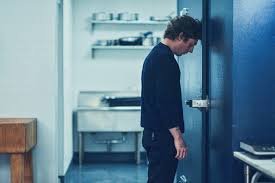Amidst a host of negative reviews, I may be the only person who enjoyed season three of The Bear. Many top television critics, including Alan Sepinwall, had a more tepid and mixed reaction to this season. Slate famously took a controversial stance, stating The Bear was “not a good show.” To me, season three of The Bear epitomizes the promise of prestige television -- bigger stars, bigger budgets, and higher production quality.
Fundamentally, season three of The Bear cemented what I already understood it to be -- a grief show about cooking. Season three is ambitious and challenging, and it doesn’t allow the limitations of the television medium to dictate how the stories it wants to tell should be told.
Image Credit Hulu, FX Networks
This third season is a more in-depth meditation on many of the themes the show has circled for two seasons, the most obvious being topics like grief, generational trauma, and the ways in which we carry these ideas into adulthood. Once again, the season excises those wounds with an undeniable emotional honesty, if not a certain messiness that is painfully true to life.
I have always been deeply touched by this show’s portrayal of ambition and how, particularly when used to get away from something else, this ambition can subsume your life. This season made clear that as much as The Bear is about fulfilling Carmy, the central character's, unrealized dream, it is also about trying to make meaning out of the worst things that have happened to him.
Three seasons in, the question remains unanswered - is Carmy's pursuit of his passion a noble one? I would argue that this question is one of the least interesting the show could answer, and the “why” seems like something the show is quietly much more interested in meditating on than resolving. The idea of passion and purpose animates this season, and, for better or worse, Carmy’s ambition is the orbit in which they all exist.
It’s a harrowing inverse of the solitary genius myth. Carmy is not a likable character this season, and, arguably, he never has been. He reacts to situations in painfully human ways. The exploration of his character this season proves it was never about the food for Carmy or for director Chris Storer, it’s simply a vehicle for everything else.
In the annals of TV history, season three will probably go down as one of the most masterful seasons of a television series. For anyone who was a fan of the show, it likely did not give you much, if any, of what you were expecting. In this review, I have explained very little of the plot, because frankly, the list of plot points from this season is much less important than the emotions it evokes.
The Bear has never been a show overly concerned with plot, but the pacing made you forget all of that. This season makes you aware of how little has happened, but more accurately, I think it makes you aware of how little has changed. A brand-new restaurant, custom chef coats, and well-tailored suits are not enough to heal what needs to be healed for this restaurant to succeed.
Image Credit Hulu, FX Networks
As an avid consumer of television and film, it is rare for me to be surprised by the plot. The highest mark a work can get from me is when I am so engrossed that I do not want to predict what comes next. Storer has done that masterfully in season three of The Bear. Though I am not impervious to the disappointment many people share about this season, its quirks feel like an acquired taste.
In a world where so much of the content we consume is customized by what an individual is most likely to continually engage with, having such a widely popular television show be so boldly disinterested in doing something palatable feels refreshing.
I spend a lot of time thinking about prestige television and television as an art form. To me, The Bear discovered its prestige along the way, with a first season that was released quietly. The show featured respectable working actors who turned in jaw-dropping performances, but there were no public expectations.
As the show blew up in popularity, there was no shortage of opinions on season one, but almost all were positive. The season is challenging to watch by nature, but deeply beloved by the vast majority of viewers. Then, last summer, with the weight of expectations set by the first season’s success, the second season dropped. Again, the second season was met with high praise and acclaim, and the show's actors swept award season.
The Bear was different in its second season, but it was different in a way that felt friendly and palatable. There was progress, which built up viewers to eagerly anticipate the third season. The restaurant was open now, what would this new season bring? Was Carmy going to be stuck in the fridge the whole season?
Turns out, metaphorically yes, but more on that in a minute.
The first episode of season three has been widely described as a “tone poem,” a description I decidedly do not disagree with, but I would like to offer a second descriptor.
It’s a “weed-out” episode. “Tomorrow" (season 3, episode 1), is telling you that if the lack of dialogue and unclear timeline turn you off in any way, you should turn back now. With that being the opener, I can see why Hulu would not want to release this season week to week, because of how many people would turn off the first episode and not come back the next week. From a business perspective, I can understand why they don’t want one of their flagship shows to have a chance to turn off a majority of its return viewers.
From an artistic perspective, I say let them go. This is not, and in many ways has never been a show that meets you where you’re at. It’s a show that you meet on its terms or not at all.
Image source: Hulu, FX Networks
This season was, to me, the clearest demonstration of that thesis, and, on a wider scale, a return to form for the concept of prestige TV as a whole.
There is no doubt this has been the most divisive season so far, and in many ways I think that’s by design. The rash of esoteric, critically beloved shows that become rooted in the cultural zeitgeist, like The Bear or Succession, is that there’s a silent expectation to stay within bounds once you reach a certain level of popularity. That seems counterintuitive for these shows which are known for pushing television forward and starting as quiet underdogs with groundswell support.
Yet, it’s the trap of popularity - the problem with a show that was never really designed to reach outside the bounds of its small but dedicated audience breaking out of those spaces.
To better illustrate what I mean, I want to draw some comparisons to film, and well-regarded auteur directors. For the sake of argument, I’m going to pick a director that I’m familiar with, David Lynch. In 2024, anyone who would consider themselves anything of a cinephile has an opinion on David Lynch. He is undoubtedly divisive, but well-regarded as one of the great American directors. Even those who find his work “not to their taste” can generally still see the artistry and craft involved in his work.
Yet, the same attitude is not as frequently afforded to television. I understand that inherently, the origins of and history of television in the modern age means that there is an expectation of mass appeal that does not exist in the same way for film.
In 2024, for all of its challenges, the American film industry does not expect a three-hour triptych from a critically acclaimed but polarizing Greek director (Kinds of Kindness) to do the kind of business as a sequel to a beloved animated movie from 2015 (Inside Out 2.) But both were technically released by the same company, Disney, albeit under different studios, (Searchlight Pictures and Pixar respectively.)
No television show was ever designed to entirely please everyone or capture every audience, but up until the proliferation of first cable and now streaming, the metrics for success for any given TV show were (mostly) well-defined.
Certain time slots dictated the programming aimed at the audience most likely to be watching in that time slot. That’s obvious. But the rise of first, the prestige cable show and then prestige streaming show upends all of those expectations. This is nothing new for anyone who’s had a Netflix subscription in the last five years. At some point though, the idea of prestige television swallowed up almost all television. Demanding higher budgets, shorter seasons, and bigger stars from any television show put out over the internet.
That combined with the mainstreaming of shows like Breaking Bad, Mad Men, House of Cards, and Orange is the New Black, it became an unspoken expectation that all television shows on this level could reach a widespread critical mass. Many of them do, but the problem comes when those shows, which were never intended to have wide appeal, gain widespread popularity. There comes an expectation mismanagement that the boundary-pushing and innovation it is known for should never alienate its new, bigger audience.
Sometimes they succeed, it’s not as if this is a bad approach to take or something that always spells failure, but it can breed an expectations management problem like the one we see with the latest season of The Bear.
During the press tour, actors from the show described it as a ‘totally different show’ from the first two seasons - therein lies the problem. This season deviated too far from the formula for a lot of people. Experimentation is a risk and doesn’t always work, but to me, experimentation and pushing the medium forward is the premise of prestige television fulfilled.
It is understandable to watch this season and see something not living up to its potential, but this may be a failure of the medium and the way it’s criticized to pit seasons against each other instead of on their own merit.
A lot of television these days is one-off seasons loosely tied together, and very few shows these days have the straightforward chronology of a modern network drama or sitcom.
It’s a deviation from the traditions of the form in many ways to try and do something different every season, and despite their many throughlines and shared DNA, season one and season two also feel completely different from each other. At this point, I would expect nothing less from a show like The Bear, and in fact, I would be disappointed if this show executed a new season in the way that I expected. Although for me, one of the markers of a show I love is being released from having any expectations for new episodes.
These shows often have a very singular creator with a singular vision, which is something prestige television has not only made possible but encouraged. With television as an industry in a contraction, we’re going to see fewer big swings for a while. Maybe I’m one of the few that this big swing worked for, but I for one am glad to see a prestige TV show live up to the possibility of its premise.
-
https://www.rollingstone.com/tv-movies/tv-movie-reviews/the-bear-season-3-review-1235045666/
https://slate.com/culture/2024/06/the-bear-season-3-fx-hulu-bad.html
https://amt-lab.org/blog/2024/4/taylor-lien-prestige-tv-research
https://www.hollywoodreporter.com/tv/tv-reviews/the-bear-review-1235163263/
https://www.indiewire.com/news/analysis/the-bear-season-3-viewers-vs-your-honor-dexter-1235029825/
https://collider.com/kinds-of-kindness-domestic-box-office-350-thousand/
https://www.nielsen.com/insights/2023/how-to-measure-tv-audiences/



